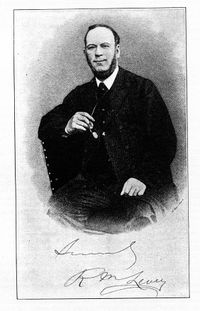Biography:R.M. Levey: Difference between revisions
m (Text replacement - "garamond, serif" to "sans-serif") |
m (Move page script moved page Biography:R.M. Levey to Tmp:R.M. Levey without leaving a redirect) |
(No difference)
| |
Revision as of 10:27, 21 January 2023
R.M. Levey
| |
|---|---|
| Given name: | Richard |
| Middle name: | Michael |
| Family name: | (O'Shaughnessy) Levey |
| Place of birth: | Dublin |
| Place of death: | Dublin |
| Year of birth: | 1811 |
| Year of death: | 1899 |
| Profile: | Musician |
| Source of information: | http://www.mally.com/details.asp?id=838 |
Biographical notes
Quoted from Francis O'Neill's Irish Minstrels and Musicians (1913), "Famous Collectors of Irish Music," pp. 141-143.
Of the host of irish musicians whose talents have immortalized their names during the the last century, the subject of this brief biography is one of the few who paid more than casual attention to the native dance music.
R.M. Levey, whose true name was Richard Michael O'Shaughnessy, was born at Dublin in 1911 and died there in 1899. Displaying a decided predilection for music in boyhood days, he served an apprenticeship to James Barton from 1821 to 1826, after which he entered the Theater Royal Orchestra, being then but fifteen years old. A few years later he became musical director.
As a violinist of unusual gifts he was well known at the Crystal Palace Handel Festivals, and other musical events in London, and the incident which led to his change of name occurred on the occasion of his first visit to the metropolis. When asked his name by the official in charge of enrollment, he promptly replied "Richard Michael O'Shaughnessy." "O'whatnessy? echoed the astonished official. "O'Shaughnessy," repeated the bewildered violinist. "My friend," volunteered his questioner, "you can never hope to make a success in professional life with an unpronouncable name like that. By the way, what was your mother's maiden name?" When told it was Leavy, the official wrote down Levey, and announced to the abashed musician, "Hereafter you will be known as R.M. Levey in this establishment." An tru enough it is by that Hebraic cognomen he is known in musical history.
Wallace and Balfe were among his most intimate friends and he toured Ireland in 1839 with the latter's opera company. In all, Levey composed fifty overtures and arranged the music for fort-four pantomimes, and he often alluded with pardonable pride to Sir Robert Stewart, and Sir Charles Villiers Stanford, as his pupils. He was also professor of the violin at the Royal Irish Academy of Music, of which he was one of the founders.
His oldest son and namesake, born in 1833, became a violinist of renown and won distinction at concerts in Paris and later in London where he was known as "Paganini Redivivus." Another son, William Charles Levey, no less talented, also won recognition in Paris, and was subsequently conductor at Drury Lane and Covent Garden theaters.
With all his accummulated honors this famous Irish musician did not disdain the simple folk music of his ancestors. On the contrary, all through life he cherished a love for the unpretentious melodies of the Green Isle, which he noted down from the playing of traditional fiddlers and fluters in Dublin and London. In the latter city he published in 1858, and in 1873, two unclassified collections of The Dance Music of Ireland, each containing one hundred tunes. Only in one instance, he tells us in a footnote, did he alter in the slightest degree the tunes which he obtained as above stated. Levey's was the first work ever printed devoted to Irish dance music exclusively.
One of Levey's violin students was Charles Villiers Stanford, a composer of church (Anglican) and secular music, and the editor of collector George Petrie's (1790-1866) music manuscripts.
Reg Hall, in his book A Few Tunes of Good Music (2016, p. 99) writes:
The popularity of such [i.e. Clog and jig] dancers on music hall bills required suitable music from the pit orchestra, which probably accounts for the publication in 1858 and 1873 respectively of The Dance Music of Ireland Volumes 1 and 2 by the theatre musician Richard Levey.
